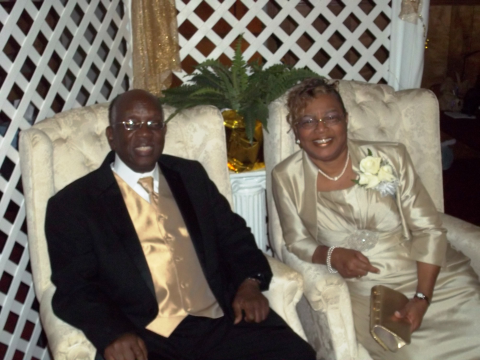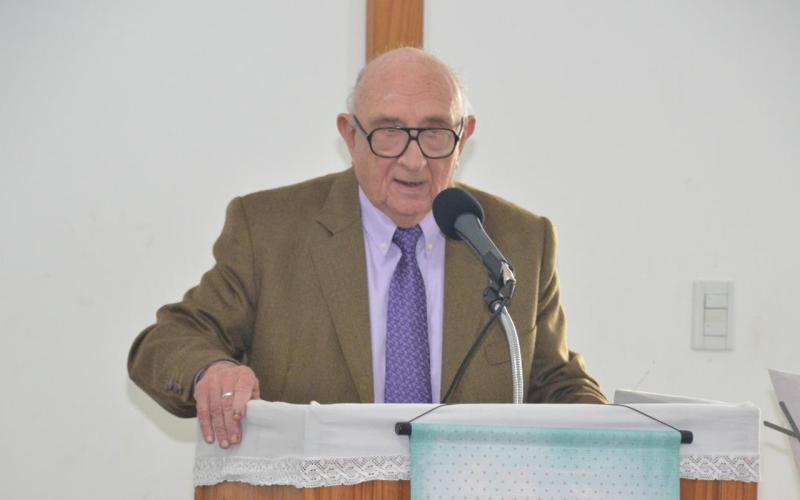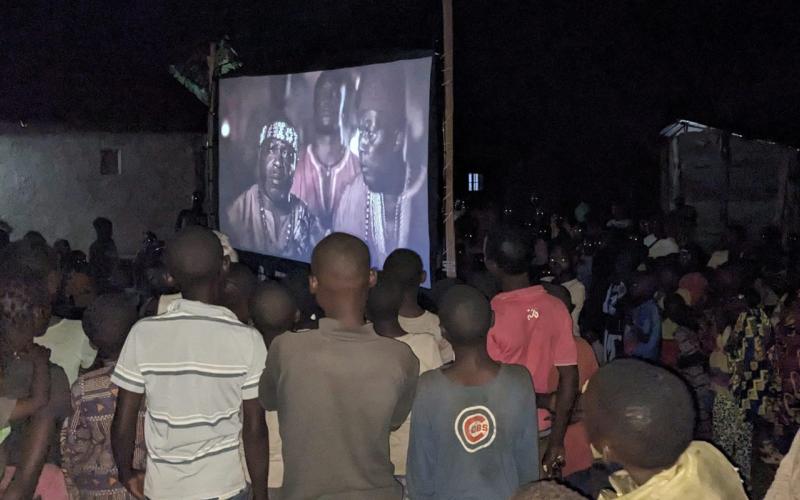
Celebration honors Johnson for 50 years at pastorate; street named in his honor

In July 1961, Charles Johnson became pastor of the Fitkins Memorial Church of the Nazarene in Meridian, Mississippi. Fifty years and countless memories later, Johnson is still impacting lives at the church.
This month, the church honored Charles and Shirley Johnson for 50 years of ministry with a week of special events, culminating with two services on Sunday, July 17.
The final day of services was attended by General Superintendent Eugenio R. Duarte and General Superintendent Emeritus W. Talmadge Johnson, among others.
Talmadge Johnson, who served as superintendent of the Mississippi District from 1975 to 1980, preached during the final celebration service.
Resolutions and presentations were made by the mayor of Meridian, the Honorable Cheri M. Barry, as well as other government officials.
One of the many highlights of the celebration was the announcement that 38th Avenue, where the church is located, will be renamed “Dr. Charles Johnson Avenue.” Also, July 15 and 16 will be recognized as Charles’ and Shirley’s day in the city of Meridian.
Duarte brought greetings from the Board of General Superintendents and the global church family, and Greg Mason, Mississippi District superintendent, brought greetings on behalf of the district. Greetings from Oliver Phillips, Mission Support USA/Canada director, and Nina Gunter, general superintendent emerita, were read.
A choir of ministers and pastors raised under Charles Johnson’s leadership sang a special song, as did the Fitkins choir. A gift was presented from Trevecca Nazarene University on behalf of its president, Dan Boone, a Mississippi native, by Michael Johnson, assistant to the president.
The widow of Charles Johnson’s best friend, Roy Fralin, also brought greetings. Fralin, who attended Nazarene Bible College of Institute, West Virginia, with Charles Johnson, died of cancer when he was 52.
Fralin’s widow read a letter from her son thanking Charles for one of the last memories he has of his father: Laughing like a schoolboy on the phone with his old Bible college buddy.
“We had so much fun in Bible school,” said Ms. Fralin as she wept.
At this time, Charles Johnson stood and broke into spontaneous song:
I thought number one would surely be me
I thought I could be what I wanted to be
I thought I could build on life’s sinking sand
But I can’t even walk without You holding my hand!
The congregation joined in when he began the chorus.
I can’t even walk without You holding my hand
The mountain’s too high. The valley’s too wide.
Down on my knees, where I learned to stand.
I can’t even walk without You holding my hand.
The service also included preaching by Charles Tillman, pastor of the Richmond, Virginia, Woodville Church of the Nazarene, and Alfred Glasper, pastor of the Lexington, Kentucky, Gethsemane Church of the Nazarene.
Tillman and Glasper are two of the 30 preachers called into ministry under Johnson’s tutelage. Of the 30, more than a dozen returned for the 50th anniversary celebration.
Among them was Bob Lanier.
Lanier said he remembered the pastor of the little, white, insignificant church across the street from his home. He could sit on his front porch and peer through the front doors of the church he had no intentions of entering.
“This persistent pastor just kept coming, though,” he said. “And then he started eatin’ up all my food!”
To the audience’s delight, Lanier told of the unrelenting pursuit this pastor had for him and his life.
“Dr. Johnson taught about respect and honor for the family and toward women,” Lanier said. “He taught by example these things that no one else had ever taught me. He is the epitome of what a man of God is and what a pastor is for a community.”
Lanier now serves as the pastor of the One Accord Church of the Nazarene in Jackson, Mississippi.
Myron Hairston, pastor of Victory Praise and Worship Center of Pascagoula, Mississippi, came back to sing and tell how he was sanctified on the steps of Johnson’s front porch.
“I landed there on a day when I did not know where else to go and did not know what else to do,” Hairston said.
A special choir extravaganza was on Friday night featuring current and former musicians and singers, many coming from out of state. A banquet was Saturday night, featuring dozens of tributes.
While Johnson was celebrated for his work in the church, his work outside the church doors is extraordinary in its importance to the African-American community in Meridian, in Mississippi, and beyond.
Johnson founded the Meridian Action Committee, the local Civil Rights group that helped to desegregate lunch counters, restaurants, movie theaters, etc. Under the leadership of Johnson, the committee also helped to break down discrimination in hiring practices in local department stores, grocery stores, and convenient stores.
The committee used boycotts and picketing to accomplish these victories. Johnson also led the picketing of Meridian City Hall against police brutality until policemen stopped beating blacks unmercifully.
He met and marched with Martin Luther King and Ralph Abernathy and was the counselor for two of the three civil rights workers killed in Neshoba County, the subject of the movie “Mississippi Burning.”
In 1972 Johnson helped organize the Meridian O.I.C., a job training and job placement program. Through O.I.C. doors were opened to place people in banks and corporate offices in Meridian and elsewhere.
He was appointed to the National Man Power Board by former U.S. President Jimmy Carter and served on the Mississippi governor's Colonel Staff.
Johnson’s life and contributions to the Civil Rights Movement have been noted in several books, including Three Lives for Mississippi, Attack on Terror: The FBI Against the Ku Klux Klan in Mississippi, We Are Not Afraid: The Story of Goodman, Schwerner, and Chaney, and the Civil Rights Campaign for Mississippi, by Seth Cagin, and Terror in the Night, by Jack Nelson.
A native of Orlando, Florida, Johnson came to Meridian having graduated from Nazarene Bible College in Institute, West Virginia. He later studied church planting at Fuller Institute, in Pasadena, California, and completed management Training at O.I.C. Academy of Management Training. Johnson received an honorary doctor of divinity degree from Trevecca.
Within the Church of the Nazarene, Johnson has been active as a revival and campmeeting speaker, and in 1982, he was appointed national ethnic consultant for Black Evangelism. He has served the Mississippi District as a District Advisory Board member, district chairman of Sunday School Ministries, and interim district superintendent. He currently serves as assistant to the district superintendent in charge of African-American Ministries.
Representing the denomination at the celebration, General Superintendent Duarte expressed his gratitude for the great things he experienced in Meridian.
“This will stay with me a long time,” Duarte said.
He described Johnson as “someone who knows how to love” and Duarte was inspired by the spirit of the church, calling it a “model (church) that is blessed by God.”
At the end of the three-and-a-half hour celebration, Johnson responded to the many greetings, tributes, songs, and testimonies, perhaps a little fatigued from reliving 50 years of ministry and life.
He wiped his head, smiled, and shrugged humbly, “I never cease to be amazed.”
Mississippi District Superintendent Greg Mason and Oxford, Mississippi, Church of the Nazarene Pastor Chet Bush contributed to this report.
Rev. Bush is currently writing a book on the life and ministry of Dr. Charles Johnson. To read his initial entry chronicling the 50th Anniversary Celebration,click here.




